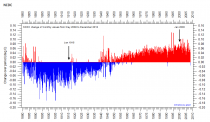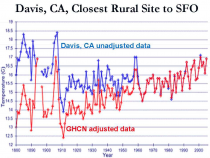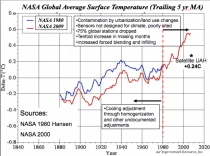A retired Western Washington University professor testified to a Republican-controlled state Senate committee Tuesday that climate change stopped in 1998 and that human-caused greenhouse gases are not responsible for fluctuations in the Earth’s temperatures or melting polar ice caps.
The startling testimony from emeritus professor Don Easterbrook is at odds with an apparent consensus among climate scientists and climate-science literature about human causes behind the the rise in global temperatures over the past century. His testimony came one day after the Legislature sent Gov. Jay Inslee a bill that sets up a legislative work group to study Washington’s best strategy for addressing climate change.
Substitute Senate Bill 5802 creates a four-caucus study panel that will hire a consultant to study state options for cutting greenhouse gas emissions to 1990 levels by 2020, and how best to accomplish that at least cost. Republican Sen. Doug Ericksen of Ferndale, who invited Easterbrook to testify at his committee, could become Senate Republicans’ representative on that panel.
It is unclear what effect Easterbrook’s testimony—and his critique of Inslee’s original bill—will have on that bipartisan study work, if any. But the geology professor’s statements stunned Democratic Sen. Kevin Ranker of Orcas Island and other Democratic members of the Senate Energy, Environment and Telecommunications Committee who listened with skepticism, if not incredulity.
Ranker and Sen. Andy Billig, D-Spokane, took issue with Easterbrook’s assertion that NASA, the National Science Foundation and National Oceanographic and Atmospheric Administration would “manipulate” climate data and create a false impression that climate change is real and that global temperatures are rising. They argued there is an apparent consensus in scientific literature.

Enlarged. Change in data after 2008 with removal of UHI adjustment and other changes.
“They have frankly tampered with the data ... Mine is the original data,” Easterbrook said at one point. Pressed on this by Ranker, he added it wasn’t anything “scurrilous” done by the science panels but he insisted that data had been “adjusted” in ways that made it less accurate than his interpretations.
ICECAP NOTE: Here is Davis CA, in Barbara Boxer’s district showing the adjustments that created warming from cooling. Then we show the before and after sets with contaminants left in post 1980.
His own reading of data, Easterbrook said, showed there were 20 periods of global cooling and heating over the past 500 years with the most recent cooling trend beginning in 1998 and likely to last up to 25 or 30 years. He asserted that his work was peer reviewed and indicated that he could provide that information to Ranker.
Among Easterbrook’s assertions: that polar ice caps are not melting or shrinking; that sea level not is rising in many places including Neah Bay; that sea water is not becoming acidic due to carbon dioxide, although he said oceanic and Puget Sound waters may be becoming less alkaline as a result of pollutants; and that carbon dioxide is too scarce in the planet’s atmosphere to produce climatic change. All were point-by-point refutations of claims Inslee had made in his own testimony on the bill.
But Ranker wasn’t buying it and at one point said: “The last 12 years were the hottest on record. That’s peer reviewed data I have before me.”
“I can’t answer why it is different,” Easterbrook replied, indicating he was relying on public data he has collected globally. “What I can tell you is this is original data” that had not been adjusted.
Ericksen said before the session that he wanted his committee to operate in an open and fair way and that he believed it is important to hear all sides—and that the public has many views about climate change. He also noted that the presentation comes after Inslee’s climate bill was passed. But Ericksen also questioned Easterbrook’s data at one point—saying that data for the 1930s, which the professor claimed was the hottest period on record—appeared to be cooler than temperatures today.
But in his closing remarks Ericksen thanked Easterbrook and suggested that there are unsettled questions that require lawmakers to look at “all the data that is available to us to make an informed decision.”
“I thought it was a very interesting presentation. I think obviously there are disagreements in Olympia and in the scientific world with regards to the material you presented,” Ericksen said.
Ranker said he hoped Ericksen’s decisions to hear questionable testimony was not a sign that the governor’s climate work group would get derailed. He said the question that needs to be answered is what is the best state response to climate change—not whether it is happening.
“We know conclusively we have had the hottest, days, years, months on record in the last decade or more. It just continues,” Ranker said. “The portrayal that this is a conspiracy—he said that three times to me that the data I’m looking at was manipulated by NOAA and NASA and the National Science Foundation—I find that extremely hard to believe.”






